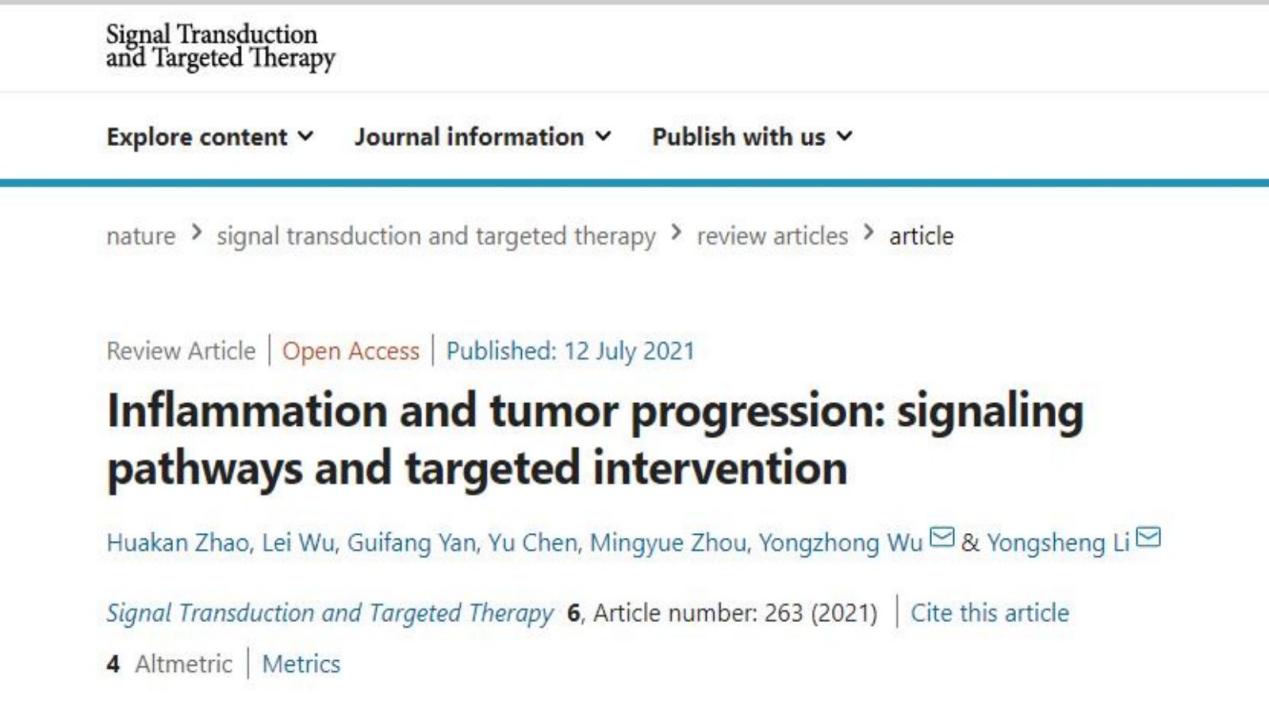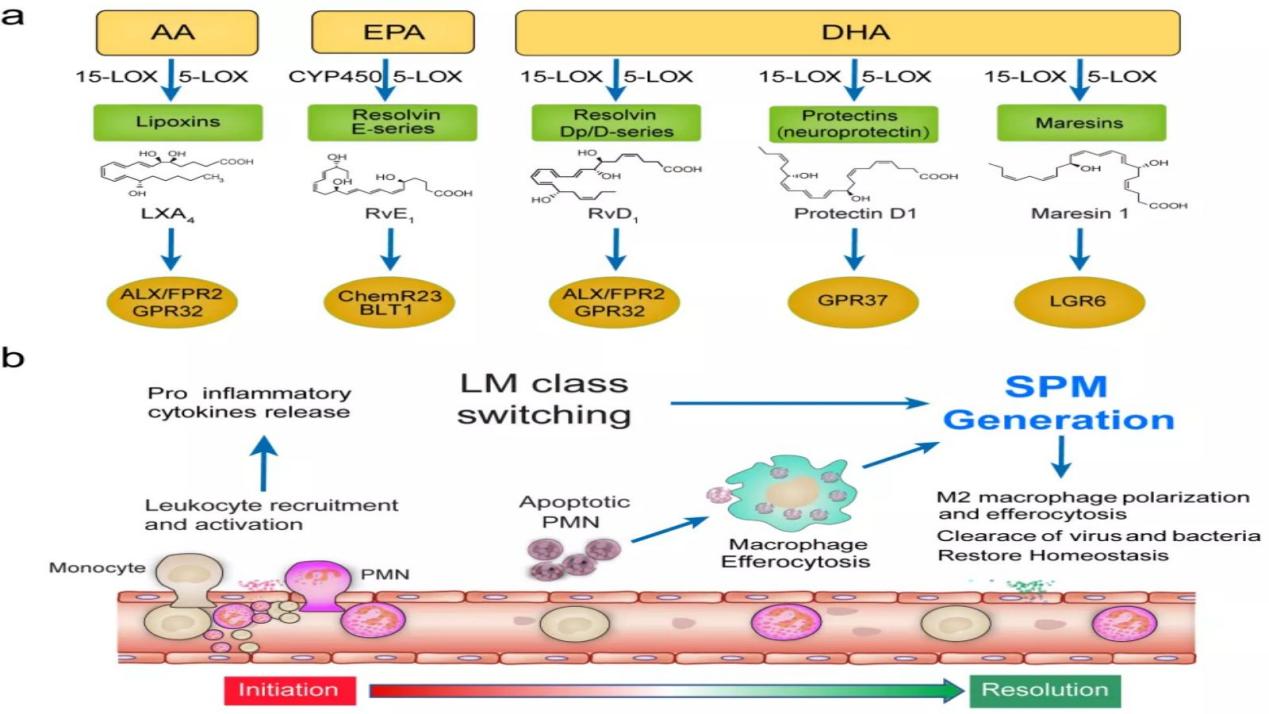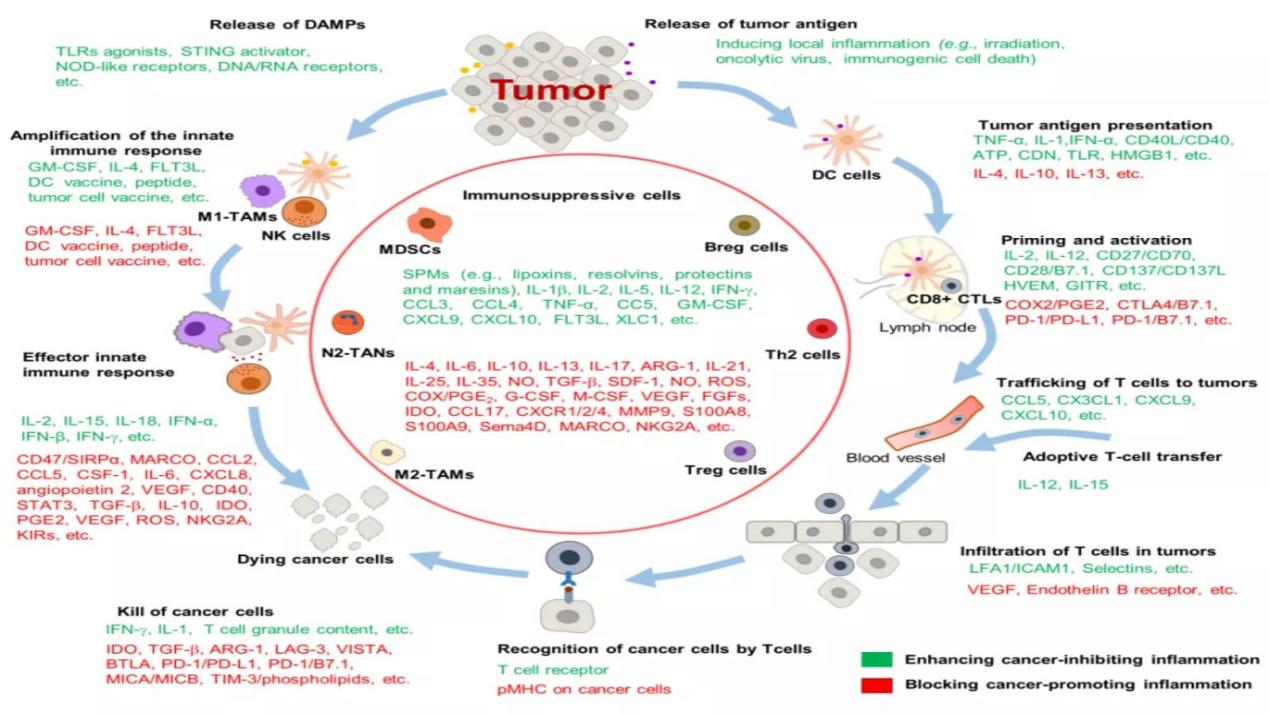Recently, the team led by Li Yongsheng and Wu Yongzhong of Chongqing University Cancer Hospital has recently published a review article titled Inflammation and Tumor Progression: Signaling Pathways and Targeted Intervention in Signal Transduction and Targeted Therapy (influence factor: 18.187). This review article includes more than 50,000 characters, citing 906 articles. Starting with the initiation and regression process of inflammation, this article systematically expounds on the complex relationship between inflammation and tumor occurrence, development and treatment, deeply analyzes the types of inflammation promoting and inhibiting cancer, and discusses in detail the intervention strategies of targeted regulation of inflammation in tumor treatment.

It is reported that at present, the medical community has found that inflammation is closely related to the occurrence and development of cancer and the efficacy of anti-cancer treatment. For example, gastric cancer is associated with helicobacter pylori infection, nasopharyngeal carcinoma is associated with herpes virus infection, liver cancer is associated with hepatitis virus infection, and systemic inflammation such as obesity and depression are also associated with the incidence of tumor and poor efficacy of anti-cancer treatment. At the same time, the inflammatory response induced by treatment also affects the clinical therapeutic effect of tumor to varying degrees.
However, some studies have found that some anti-inflammatory drugs can significantly reduce the incidence rate and mortality risk of cancer. Some proinflammatory cytokines or stimulants can promote infiltration of immune cells into infected tissues, thereby significantly improving the therapeutic effect of cancer. “This shows that inflammation is a 'double-edged sword'. The way to regulate inflammation and improve the efficacy of cancer treatment is an important problem in scientific frontier of the world. " Li Yongsheng said.

According to Li Yongsheng, inflammation can be divided into acute inflammation and chronic inflammation. Acute inflammation is the body's natural defense against damaged cells, viruses and other harmful stimuli. It starts quickly and helps the body heal itself. The process of acute inflammation is short and the inflammation usually subsides in a short time. In this process, leukocytes, lymphocytes and their chemicals, such as antibodies and cytokines, are released into the blood or affected tissues to fight foreign pathogens or inflammatory stimuli. The regression of inflammation is not the termination of passive inflammatory response, but an active programmed process initiated within the first few hours after inflammation, which involves a variety of cells, anti-inflammatory factors and regression promoting mediators. Once the inflammation cannot subside in time, it will turn into chronic inflammation, which may induce a series of inflammatory diseases, including malignant tumors.

"Inflammation can not only promote immune response, but also lead to immunosuppression. Innate immunity and adaptive immunity in inflammatory response play an important role in tumorigenesis, progression and metastasis. " Li Yongsheng said that on the one hand, most inflammatory cells in acute inflammation can kill pathogens, promote tissue repair and prevent tumor growth, and use stimulants and inflammatory factors to activate the immune system, so as to play a role in inhibiting cancer; on the other hand, cytokines produced by chronic inflammation induce angiogenesis by inducing gene mutation, changing the expression and transformation of oncogenes and tumor suppressor genes, inhibiting cell apoptosis, resulting in abnormal inflammatory signal transduction pathway. In addition, chronic inflammation promotes the establishment of immunosuppressive tumor micro-environment (TME) by recruiting a variety of immunosuppressive cells (M2-TAMs, MDSC, Treg, and etc.), so as to promote the occurrence and development of tumor. Furthermore, systemic chronic inflammation (obesity, depression, and etc.) and treatment induced chronic inflammation also affect the immune system and promote the occurrence and development of tumors.

Li Yongsheng said that chronic inflammation has been proved to be one of the reasons of occurrence and development of tumor. Firstly, the use of non-specific anti-inflammatory drugs can inhibit chronic inflammation, prevent tumor occurrence and improve the killing effect of other therapies on tumor cells in the early stage; Secondly, for some specific inflammatory mediators produced in the process of tumorigenesis and treatment, antibody neutralization or targeted inhibition of inflammatory signal pathway can be used. In addition, targeting immune cells, inflammatory mediators and cytokines in immunosuppressive TME helps to break immunosuppressive TME and improve the effect of anticancer therapies such as chemotherapy, radiotherapy and immunotherapy.
Li Yongsheng added that in recent years, in-depth research on the relationship between inflammation and tumor has achieved many gratifying research results. However, there are still many key problems to be solved on how to regulate inflammation to improve the efficacy of cancer treatment. In addition, the different inflammatory reactions of cancer patients should be considered in the anti-tumor process. Personalized treatment strategies for specific tumor related inflammation will help to improve the anti-cancer efficacy.
